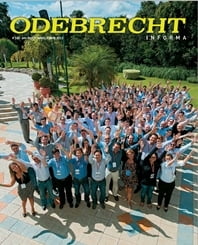Edition 160 – Here, now, in our hands
An Odebrecht Foundation initiative in northeastern Brazil is helping groom youths to become rural entrepreneurs
1 de June de 2012
An Odebrecht Foundation initiative in northeastern Brazil is helping groom youths to become rural entrepreneurs
1 de June de 2012

written by Gabriela Vasconcellos
photos by Almir Bindilatti
It’s before dawn, and André Carlos dos Santos, 25, is already at the bus station in Ituberá, Bahia. It is 5 am on a Friday, but he shows no sign of fatigue. All week long, he divides his time between a Business Administration course, working in the financial area of the Institute for the Sustainable Development of the Southern Bahia Lowlands (IDES), chairing the community association of Lagoa Santa, his home town, and conducting workshops on tourism, sports and reading in the region.

Once a month, André also takes part in the educational workshops of the Program for Developing Young Entrepreneurs (PDJE). That is why he was waiting for a bus at such an early hour. Juggling all these activities is no easy task. Everyone who knows him jokes that there are more than 24 hours in his day. André has had to plan his schedule to cope with it all. “I’ve created a routine. I learned to manage my time during one of the modules of the PDJE. That was the subject that most caught my attention,” says André, who is also responsible for the logistics of transporting the other participants.
The PDJE is an initiative of the Odebrecht Foundation. In line with the Odebrecht Entrepreneurial Technology, it contributes to the professional education of 21 young rural entrepreneurs who are currently working at institutions or projects that are part of the Program for the Integrated and Sustainable Development of the Mosaic of Environmental Protection Areas in the Southern Bahia Lowlands (PDIS). The majority are former students of the teaching units linked to the PDIS. André is one of them. For him, joining the Agroforestry Family House in 2006 was a life-changing experience
“I always stop to think and analyze what my life was like in the past. I can’t believe how far I’ve come today,” says André, who grew up in a maroon community. He points out that even his relationship with his family has changed. “My parents are proud to see me replicating knowledge in our community. My Mom says I’m a young role model.”
Ongoing education
In this second edition of the PDJE, 11 modules have already been taught and seven others will be covered by the end of 2012. They address topics such as leadership, personal expression, life and career plans, globalization, sustainability, citizenship, project design, communication and business security.
According to Gilcia Beckel, the coordinator of the second PDJE class, the essence of the program is developing entrepreneurship among young people. “Their enthusiasm and interest are clearly visible. This ongoing education program is contributing to the growth of each individual. They had great expectations about how this process would work. Today they actively participate in discussions. The lecturers can’t praise them enough,” says Gilcia, who joined the Odebrecht Organization 28 years ago and is currently a human development consultant at the Odebrecht Foundation.
In addition to receiving follow-up from Gilcia, during each module the participants interact with facilitators, including members of the Odebrecht Foundation and the PDIS, and specialists. Maria Celeste Pereira, Executive Director of the Rights and Citizenship Institute, which is linked to the PDIS, was one of those people. “The proliferation of learning is the result of a commitment to the socialization of acquired knowledge. Our understanding is that knowledge contributes to the formation of a more just and democratic society,” says Maria Celeste, who was one of the 18 young people who took the first edition of the PDJE and now shares her experiences.
Ana Paula Conceição, a participant in the second group, underscores this point. “It makes no sense to keep this knowledge to ourselves. We need to replicate it, make it available to the community,” argues the Youth House State High School alumna, who is currently a multiplier agent for the Reading Circles project, which encourages reading and reading comprehension to contribute to the development of new leaders.
Valéria Nakamura, a consultant from Triáde do Tempo, was the facilitator for a debate on “Being an Entrepreneur – Strategic Thinking.” “The group was fully engaged with the questions and arguments. I was very pleased with how the activities were carried out. The important thing is the knowledge they take away with them.” According to Jeane Oliveira, a farmer who is also a member of the Pratigi Environmental Protection Area Guardians Association, the theme of this debate made the strongest impression. “What we have here is an opportunity to improve what we see in our work and our personal lives. Everything is connected. We are professionalizing the information,” says Jeane, who is also a graduate of the Presidente Tancredo Neves Rural Family House.
André makes the most of this exchange and doesn’t want to miss a single module. “What I get most from the speakers is their example, their experience. These are people who have life experiences we can use.” He sees all the activities as a priority. “I’m striving to follow my life and career plan. I’ve managed to accomplish a lot. My family used to live in a mud hut, and now we have better housing. I’ll graduate from college at the end of the year. Things are happening. I’m meeting my deadlines.”
Do you wish to be
a partner in our projects, make
a donation or hire our technical consulting?
Send a message
right now!